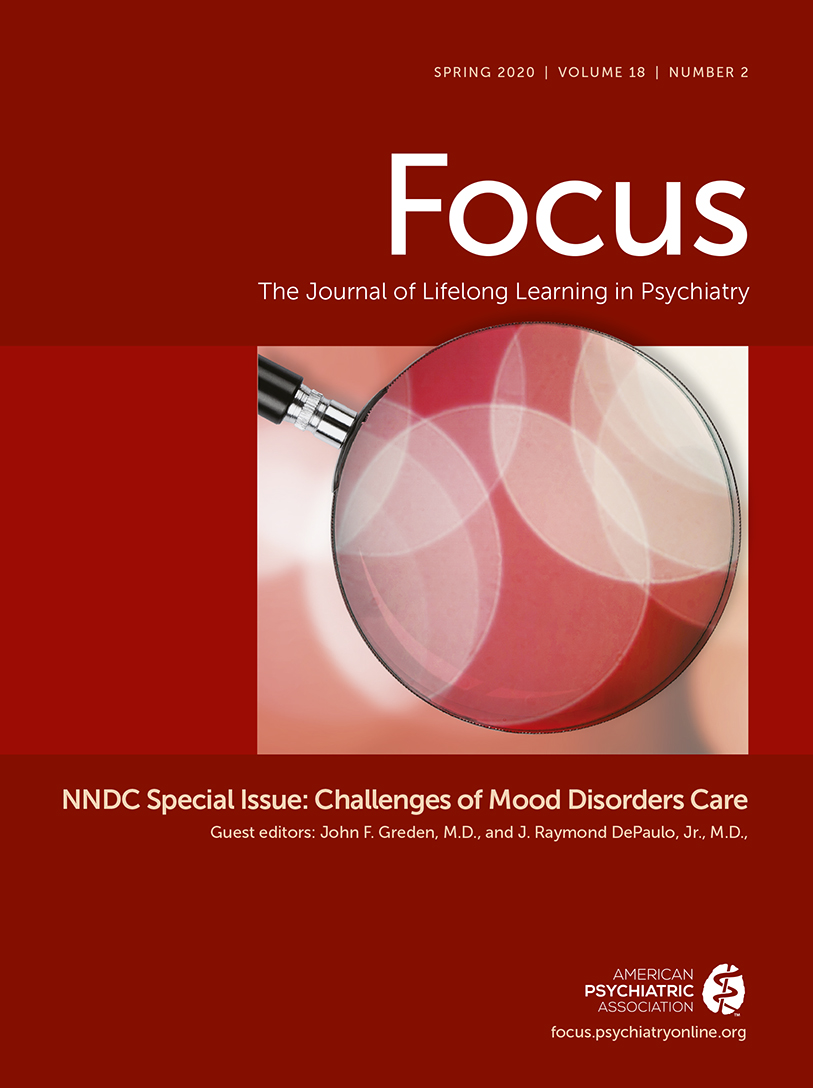NNDC Special Issue: Challenges of Mood Disorders Care
Mood disorders are complex, in every sense of the word. They can be challenging to diagnose and even more so to treat. Researchers are still trying to illuminate the fundamental mechanisms behind these illnesses, and there are many other challenges in treating patients affected by them. Patients often lack access to care, for example. Clinicians lack robust knowledge about which treatments are most precise and effective for which patients because there are many heterogeneous causes of the depressive phenotype, and patients are unique in how the illnesses manifest for each and how they adapt to the challenges inherent in mood disorders. These challenges can be overcome, but to do so requires large-scale, multisite initiatives to advance knowledge and thus improve clinical practice to treat and prevent mood disorders. The National Network of Depression Centers (NNDC), a collaborative network of academic medical centers committed to patient care, research, and education for patients with depressive and bipolar illnesses, was formed to meet that need.
When invited us to edit this issue, we turned to clinical leaders in the NNDC who work every day to overcome the challenges and to provide great care for patients with mood disorders. This issue offers state-of-the-art reviews on preventing suicide (1) and on the impact of the opiate crisis on suicide (2) as well as how postpartum depression differs from depression occurring outside the perinatal period (3). One article tackles the clinical question of whether stopping effective antidepressant treatment is ever safe (4). We offer articles on the complexities of managing mood disorders in adults (5) and in specific populations, such as adolescents (6) or people with a traumatic brain injury or Parkinson’s disease (7). Finally, we feature articles on integrating technology into clinical care (8–10) and explore the clinical question of what to do next after a patient’s treatment-resistant depression responds to ketamine (11). These articles, from many different NNDC sites, reflect the clinical expertise in NNDC as well as several ongoing collaborations underway among its members.
As you will see from this collection, the NNDC is working to deliver on its mission (12) to transform lives through innovations in treatments for and prevention of depression and bipolar illnesses. We are also well underway, not described herein, on new large-scale, multisite and multinetwork research initiatives that are key to long-term success and that were the impetus for creating the Mood Outcomes Program, a clinical registry of more than 12,000 patients with mood disorders being treated at our member centers. We hope such a robust clinical resource will provide a platform for studying putative biomarkers, innovative interventional treatments, and the large and long-term studies needed to improve outcomes in mood disorders. The NNDC has teams ready to collaborate and patient resources to bring promising research findings to scale so the field can disseminate clinical best practices. Our vision is a world free of stigma, where all have access to evidence-based care for mood disorders.
1 : Suicide risk assessment and prevention: challenges and opportunities. Focus 2020; 18:88–99Link, Google Scholar
2 : Clinical perspective on opioids in the context of suicide risk. Focus 2020; 18:100–105Link, Google Scholar
3 : Is postpartum depression different from depression occurring outside of the perinatal period? A review of the evidence. Focus 2020; 18:106–119Link, Google Scholar
4 : Consequence of recurrence of major depressive disorder: is stopping effective antidepressant medications ever safe? Focus 2020; 18:120–128Link, Google Scholar
5 : The care of patients with complex mood disorders. Focus 2020; 18:129–138Link, Google Scholar
6 : Management of complex co-occurring psychiatric disorders and high-risk behaviors in adolescence. Focus 2020; 18:139–149Link, Google Scholar
7 : Depression comorbid with stroke, traumatic brain injury, Parkinson’s disease, and multiple sclerosis: diagnosis and treatment. Focus 2020; 18:150–161Link, Google Scholar
8 : Computer-assisted CBT and mobile apps for depression: assessment and integration into clinical care. Focus 2020; 18:162–168Link, Google Scholar
9 : Advancing treatment of depression and other mood disorders through innovative models of telepsychiatry. Focus 2020; 18:169–174Link, Google Scholar
10 : Real-time monitoring: a key element in precision health and personalized health. Focus 2020; 18:175–180Link, Google Scholar
11 : Next-step treatment considerations for patients with treatment-resistant depression that responds to low-dose intravenous ketamine. Focus 2020; 18:181–192Link, Google Scholar
12 : The National Network of Depression Centers: Progress Through Partnership. Depression and Anxiety 2011; 28:615–621Crossref, Google Scholar



